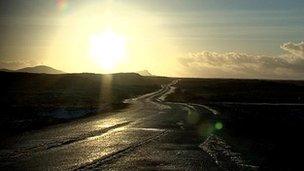Mackerel stalemate with Iceland holding strong
- Published
Iceland has just set another annual quota for mackerel
It is a bitter row which is now entering its fifth year, but there seems little end in sight for the international dispute on the rights to fish Scotland's most valuable stock.
Iceland has just set another year's quota for mackerel, defying scientific guidelines on sustainable fishing.
The Scottish industry and the European Union say the stock will eventually be ruined if overfishing continues and both blame Iceland and the Faroe Islands.
So why such defiance from the two counties which do not have a history of fishing this species?
At Reykjavik harbour, another trawler lands its latest consignment of frozen fish for export.
It is a massive industry for this small country and so the government is doing all it can to give it a lift.
At the nearby Ministry for Industries and Innovation, the defiant minister who is leading the fight tells me their recent claims on mackerel fishing are vital for the whole industry.
Steingrimur J Sigfusson said: "It's not really Iceland that has changed its policy. We are a fishing nation and we utilise our rights as a fishing nation and coastal state when it comes to demanding a fair share in migratory species.
"The one that has really changed its policy is the mackerel," he adds.
Scientists at the government's Marine Research Institute are the ones who are seeing the changes.
They suggest the mackerel is moving north as the sea warms up and that traditional fishing targets like cod are being pushed out as a result.
Institute director Johann Sigurjonsson told me: "We have observed dramatic changes in oceanographic conditions around Iceland since the late 1990s and we have, as a consequence of that, observed dramatic changes in the composition of fish fauna and other animal life."
Cod Wars
Iceland still has a very healthy fishing fleet at ports right across the country.
There is a very rich and deep tradition associated with the industry and people would not thank any government that didn't fight for its future.

The road to resolution looks a long one for the nations involved
Memories of the Cod Wars of the 1970s show how hard Iceland has been prepared to fight in the past, with mid-sea collisions resulting in damaged boats.
They eventually won their fight to extend national fishing boundaries.
Today's skippers like Arni Bjarnason are used to winning, and fear the consequences of their current government being defeated.
He said: "I think for many reasons they are right, not least because of the other species which are after the same food as mackerel and if we do not do anything about it, it will end in a very sad way for us."
Scotland and the EU insist Iceland is sanctioning an excessively large quota for its own fleet.
'It's unfortunate'
Figures vary but the Scottish industry claims the country is taking about 23% of the quota compared with 1.7% before 2008.
But the minister in Reykjavik says the blame for overfishing cannot be laid solely at their feet.
"It's unfortunate for everyone and we shoulder the responsibility here.
"But it is no more responsible, or even less so as I see it, by the EU and Norway to join hands and decide unilaterally that they are entitled to over 90% of the suggested catch."
Scotland's fisheries secretary, Richard Lochhead, said: "We don't deny Iceland's right to have a share of the stock and we acknowledge that the fish have appeared in their waters; however, the main reason there is fish there in the first place is because other countries have been fishing the stock sustainably.
"The best way forward would be through negotiation, rather than unilaterally awarding themselves quotas."
A single continuous road circumnavigates this north Atlantic island.
Some suggest the road to an agreement may be an even longer one.
- Published6 February 2013
- Published3 February 2013
- Published28 January 2013
- Published15 January 2013
- Published12 January 2013
- Published11 January 2013